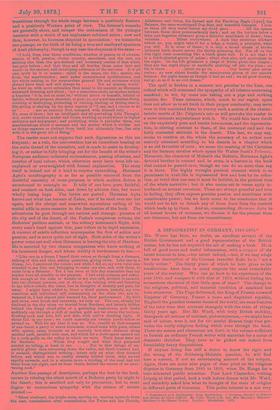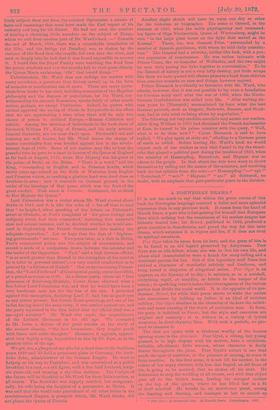A DIPLOMATIST IN GERMANY, 1810-1870.* MR. WARD has been, no
doubt, an excellent servant of the British Government and a good representative of the British nation, but he has not acquired the art of making a book. He is full of good sense and useful information, with a soupcon of sly latent humour in him,—too latent indeed,—but, if we may adopt his own description of the German traveller Kohl, he is "not a lively writer." The thirty years of which he here gives us his recollections have been in many respects the most remarkable years of the century. Who can go back to his experience of the year 1840, and compare it with that of 1870, without feeling the momentous character of that little span of time ? The change in the religious, political, and material condition of mankind has been enormous. The Pope dethroned, the King of Prussia crowned Emperor of Germany, France a tame and dispirited republic, England the guarded treasure-house of the world, are some features of the later time that contrast strangely with the state of things thirty years ago. But Mr. Ward, with truly British stolidity, disregards all notions of contrast, picturesqueness,—we might have said of colour, were it not for the scarlet Roman tinge that per- vades the really religious feeling which runs through the book. There are scenes and characters set forth in the volume sufficient to furnish an ordinary French writer with materials for a series of dramatic sketches. The,y have to be picked out indeed from formidably heavy disquisitions.
If anyone living has still a desire to know the right and the wrong of the Schleswig-Holstein question, he will find here a correct, if not an entertaining account of the subject. Again, there are some nine pages of close print on the religious disputes in Germany from 1843 to 1850, when Dr. Rouge for a time attracted public attention. Poor Lord Clarendon, visiting Leipsig at that period, took a walk before dinner with Mr. Ward, and unluckily asked him what be thought of the state of religion in different parts of Germany. This polite interest in a not very
* Experiences of a Diplomatist: being Recollections f (Jermw,y,foundel on Diaries kept during the Tears 1840-70. By John Ward, 0.B, late Her Majeety's Minister- Resident to the Hamm TOMIS. London : Macmillan. 1872.
lively subject drew out from the resident diplomatist a stream of facts and reasonings that must have made the Earl repent of his curiosity and long for his dinner. He had not even the comfort of hearing a charming little anecdote on the subject of Rouge, which we cull from another part of Mr. Ward's book :—" Towards the end of March, 1844, there was a remarkable inundation of the Elbe, and the bridge (at Dresden) was so shaken by the violence of the flood that the crucifix fell over into the river, and sank so deeply into its bed that it was found impossible to recover it. I heard that the Royal Family were watching the flood from the palace windows and saw the crucifix fall, to their great dismay, the Queen Maria exclaiming, 'Oh! that horrid Ronge !' "
Unfortunately, Mr. Ward does not indulge his readers with many anecdotes, a garniture that history served up in the form of memoirs or recollections can ill spare. There are many quota- tions from books he has read, including summaries of the Hegelian philosophy and the dogmas of materialism, for Mr. Ward, not- withstanding his staunch Romanism, speaks fairly of other creeds unless, perhaps, we except Puritanism. Indeed, he quotes with evident approval the saying of Alexis de Tocqueville to the effect that we are approaching a time when there will be only two classes of person in civilised Europe,—Roman Catholics and infidels. Among the sketches of individuals in the book those of Frederick William IV., King of Prussia, and his early adviser, General Radowitz, are the most dwelt upon. Frederick's wit and learning are well known, but Mr. Ward denies the charge of undue conviviality that was levelled against him in the revolu- tionary days of 1848. Some of our readers may like to hear the graceful turn he gave to a toast in honour of the Queen of England as far back as August, 1815, when Her Majesty was his guest at the palace of Bruhl, on the Rhine. "There is a word," said the King, "resounding in English and in Prussian hearts, which thirty years ago echoed on the fields of Waterloo from English and Prussian voices, as marking a glorious hard-won deed done as brothers-in-arms ; now it resounds on German ground, in the midst of the blessings of that peace which was the fruit of the great conflict. That name is Victoria. Gentlemen, let us drink to Her Majesty the Queen."
Lord Palmerston was a visitor whom Mr. Ward showed about Berlin in 1844, and it is like the echo of a far-off time to read that "he laughed, when speaking of the debate on Pritchard's arrest at Otaheite, at Peel's complaint of 'the gross outrage and indignity which had been committed,' imitating that minister's slow and solemn manner, and he doubted whether he would suc- ceed in frightening the French Government into making any adequate reparation." Let us hope that the days of "frighten- ing governments" are over. Two years later, at a club in Berlin, Peel's commercial policy was the subject of conversation, and record is made of a comparison drawn between the minister and the leader of the Opposition. "Peel," said a high German official, "is as much greater than Russell in the conception of his mind as he is taller in personal stature",—a very candid recollection to be printed by "a follower of Russell." One story concerning Palmer- ston, the "Lord Firebrand" of Continental gossip, seems incredible, at a period so recent as 1848. At a dinner-party, where sat "four princesses of Schleswig-Holstein, Count Reuss observed what a fine fellow Lord Palmerston was, and that he would have been a very handsome man but for the loss of his eye. I protested against this assumption, declaring Lord P. had two as good eyes as any person present. But Count Reuss persisting, and one of the ladies having heard the same story, it was carried against me, and the party separated in the firm belief that my official chief was a one-eyed minister." Mr. Ward also made the acquaintance of the Latinist Hermann in his old age. We commend to Mr. Lowe a dictum of the great scholar on the study of the ancient classics, "the best humanisers ; they inspire youth with bravo and noble thoughts." Hermann, it appears, appreci- ated very highly a ring bequeathed to him by Dr. Parr, as to the greatest critic of the age.
We get, too, a glimpse of one who for a short time in the troublous years 1848 and '49 held a prominent place in Germany, the Arch- duke John, administrator of the German Empire. He went to Leipsig on his way to Frankfort, and was entertained at a public breakfast in a tent,—a tall figure, with a fine bald forehead, sixty- six years old, and wearing a sky-blue uniform. The Carlyle of the future will be thankful to Mr. Ward for these little touches, at all events. The Archduke was happily married, but naorganati- cally, his wife being the daughter of a postmaster at Meran. It was said that she would take precedence of all other ladies in the revolutionised Empire, a prospect which, Mr. Ward thinks, did not please the Queen of Prussia. Another slight sketch will have its value one day or other for the historian or biographer. The scene is Ostend, in the summer of 1866, when the noble physiognomy and command- ing figure of Olga Nicolaevitch, Queen of Wurtemberg, might be seen "in the large glass house on the dyke that served as the Kursaal." There, too, was General Prim, "surrounded by a number of Spanish gentlemen, with whom he held daily consulta- tion." The General had a swarthy, soldier-like look, with a pen- sive expression of countenance. He was rather intimate with Prince Couza, the ex-hcepodar of Wallachia, and the two might be seen daily pacing the dyke together in conversation." To be the Boswell of history is not a very lofty destiny, yet little scraps like those we have quoted will oftener preserve a book from oblivion than oracular remarks on men and things, however sapient.
Prince Bismarck is evidently no favourite with Mr. Ward, who admits, however, that it was not possible to lay even a foundation for German unity until after the war of 1866, when the North- German Confederation was called into life. "After waiting six- teen years he [Bismarck] accomplished by force what the best German patriots, such as Gagern, Radowitz, Bunsen, and Stock- mar, had in vain tried to bring about by negotiation."
The following not very credible anecdote may amuse our readers. After King William in 1870 had dismissed the French Ambassador at Ems, he turned to his prime minister with the query, "Well, what is to be done now ? " Count Bismarck is said to have replied, "We play again at sixty-six," alluding to a German game of cards so called. Before leaving Mr. Ward's book we would request such of our readers as may visit Cassel to try the street- echo that played a political part during the troubles of 1850, when the ministry of Hassenpflug, Baumbach, and Haynau was so odious to the people. In that street the wits were wont to divert themselves by calling out the names of the ministers, and receiving back the last syllable from the echo :—" Hassenpflug !"—" ugh!" " Baumbach !" " ach !" " Haynau I" " au!" all delivered, no doubt, with an emphasis that gave particular gusto to the derision.



































 Previous page
Previous page